Individual Assignment: Business and Corporate Law (LAW121) - MNU
VerifiedAdded on 2022/12/29
|8
|2904
|36
Homework Assignment
AI Summary
This Business Law assignment addresses two case studies. The first case involves Nabahath, a salon owner, and Vishal, a builder, and explores issues of contract law, including breach of contract, consideration, and potential compensation claims. It examines whether Nabahath is liable for extra payments, can claim compensation, or can stop the work, and Vishal's potential to recover funds. The second case involves Mifsaah, a motorcycle seller, and examines sales law, including offer, acceptance, and the postal rule, analyzing whether Mifsaah is obligated to sell his Harley Davidson to different potential buyers based on their methods of offer (post, email, in-person). The assignment applies legal principles to provide advice in various scenarios, referencing relevant case authorities.
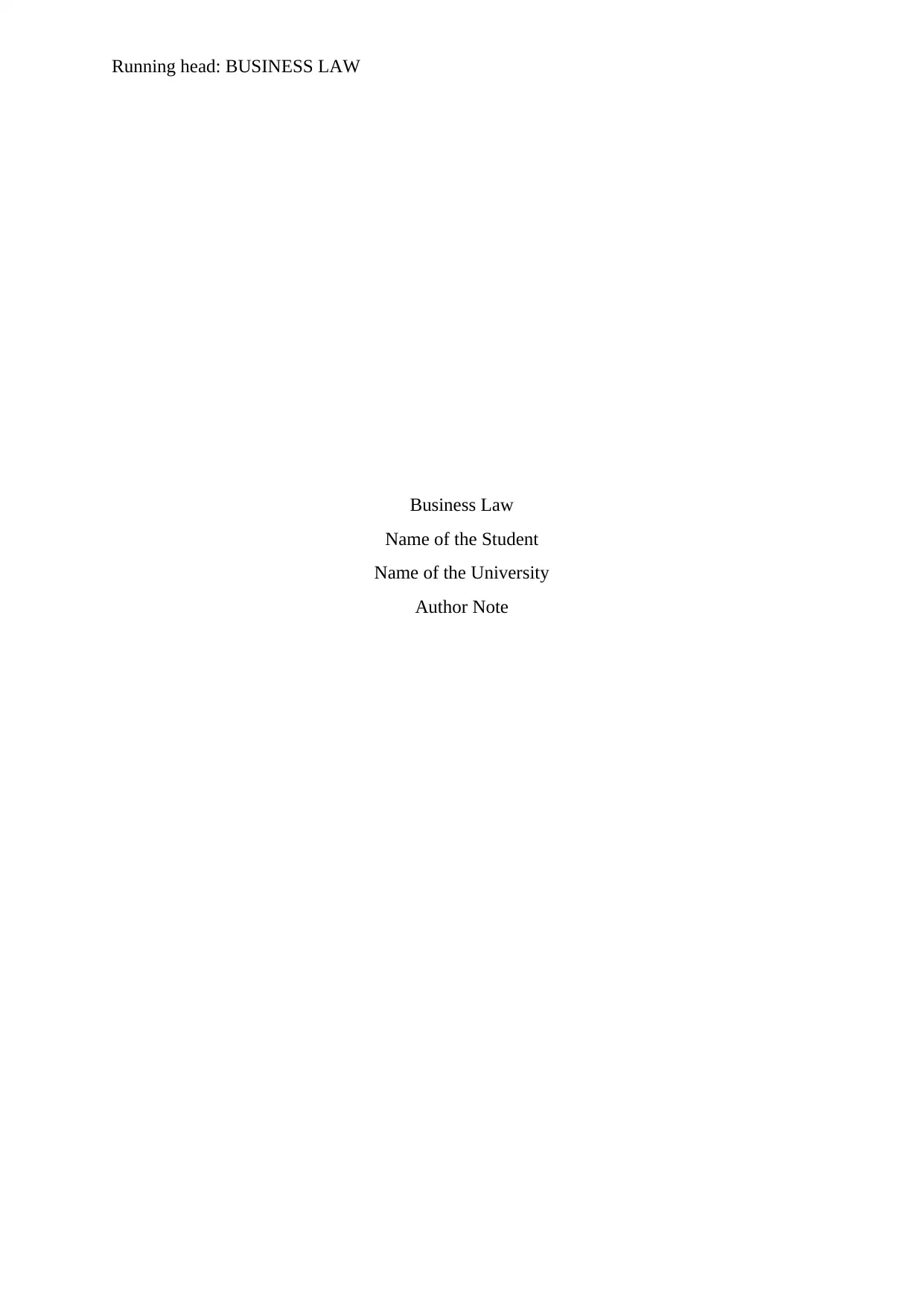
Running head: BUSINESS LAW
Business Law
Name of the Student
Name of the University
Author Note
Business Law
Name of the Student
Name of the University
Author Note
Paraphrase This Document
Need a fresh take? Get an instant paraphrase of this document with our AI Paraphraser
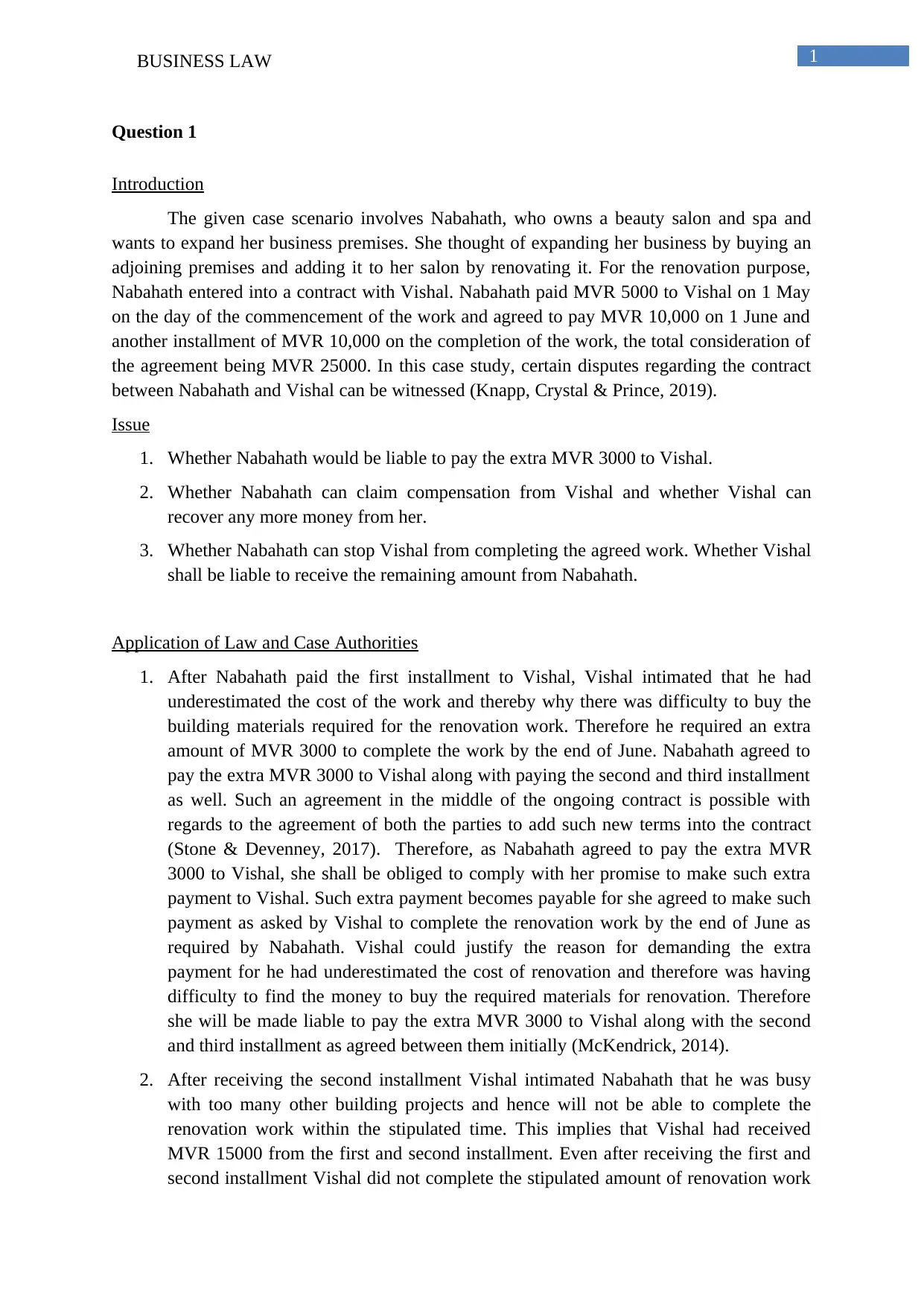
1BUSINESS LAW
Question 1
Introduction
The given case scenario involves Nabahath, who owns a beauty salon and spa and
wants to expand her business premises. She thought of expanding her business by buying an
adjoining premises and adding it to her salon by renovating it. For the renovation purpose,
Nabahath entered into a contract with Vishal. Nabahath paid MVR 5000 to Vishal on 1 May
on the day of the commencement of the work and agreed to pay MVR 10,000 on 1 June and
another installment of MVR 10,000 on the completion of the work, the total consideration of
the agreement being MVR 25000. In this case study, certain disputes regarding the contract
between Nabahath and Vishal can be witnessed (Knapp, Crystal & Prince, 2019).
Issue
1. Whether Nabahath would be liable to pay the extra MVR 3000 to Vishal.
2. Whether Nabahath can claim compensation from Vishal and whether Vishal can
recover any more money from her.
3. Whether Nabahath can stop Vishal from completing the agreed work. Whether Vishal
shall be liable to receive the remaining amount from Nabahath.
Application of Law and Case Authorities
1. After Nabahath paid the first installment to Vishal, Vishal intimated that he had
underestimated the cost of the work and thereby why there was difficulty to buy the
building materials required for the renovation work. Therefore he required an extra
amount of MVR 3000 to complete the work by the end of June. Nabahath agreed to
pay the extra MVR 3000 to Vishal along with paying the second and third installment
as well. Such an agreement in the middle of the ongoing contract is possible with
regards to the agreement of both the parties to add such new terms into the contract
(Stone & Devenney, 2017). Therefore, as Nabahath agreed to pay the extra MVR
3000 to Vishal, she shall be obliged to comply with her promise to make such extra
payment to Vishal. Such extra payment becomes payable for she agreed to make such
payment as asked by Vishal to complete the renovation work by the end of June as
required by Nabahath. Vishal could justify the reason for demanding the extra
payment for he had underestimated the cost of renovation and therefore was having
difficulty to find the money to buy the required materials for renovation. Therefore
she will be made liable to pay the extra MVR 3000 to Vishal along with the second
and third installment as agreed between them initially (McKendrick, 2014).
2. After receiving the second installment Vishal intimated Nabahath that he was busy
with too many other building projects and hence will not be able to complete the
renovation work within the stipulated time. This implies that Vishal had received
MVR 15000 from the first and second installment. Even after receiving the first and
second installment Vishal did not complete the stipulated amount of renovation work
Question 1
Introduction
The given case scenario involves Nabahath, who owns a beauty salon and spa and
wants to expand her business premises. She thought of expanding her business by buying an
adjoining premises and adding it to her salon by renovating it. For the renovation purpose,
Nabahath entered into a contract with Vishal. Nabahath paid MVR 5000 to Vishal on 1 May
on the day of the commencement of the work and agreed to pay MVR 10,000 on 1 June and
another installment of MVR 10,000 on the completion of the work, the total consideration of
the agreement being MVR 25000. In this case study, certain disputes regarding the contract
between Nabahath and Vishal can be witnessed (Knapp, Crystal & Prince, 2019).
Issue
1. Whether Nabahath would be liable to pay the extra MVR 3000 to Vishal.
2. Whether Nabahath can claim compensation from Vishal and whether Vishal can
recover any more money from her.
3. Whether Nabahath can stop Vishal from completing the agreed work. Whether Vishal
shall be liable to receive the remaining amount from Nabahath.
Application of Law and Case Authorities
1. After Nabahath paid the first installment to Vishal, Vishal intimated that he had
underestimated the cost of the work and thereby why there was difficulty to buy the
building materials required for the renovation work. Therefore he required an extra
amount of MVR 3000 to complete the work by the end of June. Nabahath agreed to
pay the extra MVR 3000 to Vishal along with paying the second and third installment
as well. Such an agreement in the middle of the ongoing contract is possible with
regards to the agreement of both the parties to add such new terms into the contract
(Stone & Devenney, 2017). Therefore, as Nabahath agreed to pay the extra MVR
3000 to Vishal, she shall be obliged to comply with her promise to make such extra
payment to Vishal. Such extra payment becomes payable for she agreed to make such
payment as asked by Vishal to complete the renovation work by the end of June as
required by Nabahath. Vishal could justify the reason for demanding the extra
payment for he had underestimated the cost of renovation and therefore was having
difficulty to find the money to buy the required materials for renovation. Therefore
she will be made liable to pay the extra MVR 3000 to Vishal along with the second
and third installment as agreed between them initially (McKendrick, 2014).
2. After receiving the second installment Vishal intimated Nabahath that he was busy
with too many other building projects and hence will not be able to complete the
renovation work within the stipulated time. This implies that Vishal had received
MVR 15000 from the first and second installment. Even after receiving the first and
second installment Vishal did not complete the stipulated amount of renovation work
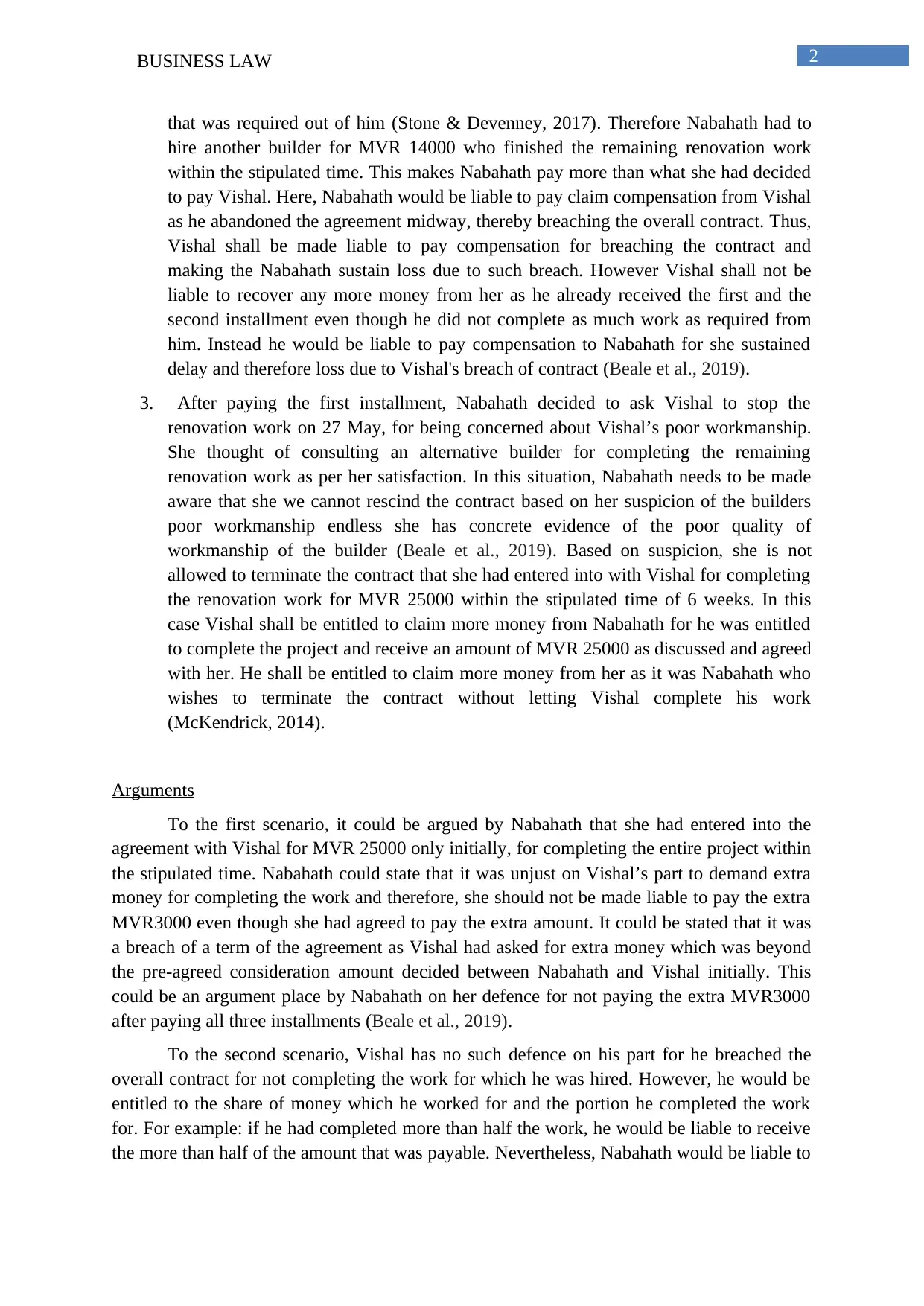
2BUSINESS LAW
that was required out of him (Stone & Devenney, 2017). Therefore Nabahath had to
hire another builder for MVR 14000 who finished the remaining renovation work
within the stipulated time. This makes Nabahath pay more than what she had decided
to pay Vishal. Here, Nabahath would be liable to pay claim compensation from Vishal
as he abandoned the agreement midway, thereby breaching the overall contract. Thus,
Vishal shall be made liable to pay compensation for breaching the contract and
making the Nabahath sustain loss due to such breach. However Vishal shall not be
liable to recover any more money from her as he already received the first and the
second installment even though he did not complete as much work as required from
him. Instead he would be liable to pay compensation to Nabahath for she sustained
delay and therefore loss due to Vishal's breach of contract (Beale et al., 2019).
3. After paying the first installment, Nabahath decided to ask Vishal to stop the
renovation work on 27 May, for being concerned about Vishal’s poor workmanship.
She thought of consulting an alternative builder for completing the remaining
renovation work as per her satisfaction. In this situation, Nabahath needs to be made
aware that she we cannot rescind the contract based on her suspicion of the builders
poor workmanship endless she has concrete evidence of the poor quality of
workmanship of the builder (Beale et al., 2019). Based on suspicion, she is not
allowed to terminate the contract that she had entered into with Vishal for completing
the renovation work for MVR 25000 within the stipulated time of 6 weeks. In this
case Vishal shall be entitled to claim more money from Nabahath for he was entitled
to complete the project and receive an amount of MVR 25000 as discussed and agreed
with her. He shall be entitled to claim more money from her as it was Nabahath who
wishes to terminate the contract without letting Vishal complete his work
(McKendrick, 2014).
Arguments
To the first scenario, it could be argued by Nabahath that she had entered into the
agreement with Vishal for MVR 25000 only initially, for completing the entire project within
the stipulated time. Nabahath could state that it was unjust on Vishal’s part to demand extra
money for completing the work and therefore, she should not be made liable to pay the extra
MVR3000 even though she had agreed to pay the extra amount. It could be stated that it was
a breach of a term of the agreement as Vishal had asked for extra money which was beyond
the pre-agreed consideration amount decided between Nabahath and Vishal initially. This
could be an argument place by Nabahath on her defence for not paying the extra MVR3000
after paying all three installments (Beale et al., 2019).
To the second scenario, Vishal has no such defence on his part for he breached the
overall contract for not completing the work for which he was hired. However, he would be
entitled to the share of money which he worked for and the portion he completed the work
for. For example: if he had completed more than half the work, he would be liable to receive
the more than half of the amount that was payable. Nevertheless, Nabahath would be liable to
that was required out of him (Stone & Devenney, 2017). Therefore Nabahath had to
hire another builder for MVR 14000 who finished the remaining renovation work
within the stipulated time. This makes Nabahath pay more than what she had decided
to pay Vishal. Here, Nabahath would be liable to pay claim compensation from Vishal
as he abandoned the agreement midway, thereby breaching the overall contract. Thus,
Vishal shall be made liable to pay compensation for breaching the contract and
making the Nabahath sustain loss due to such breach. However Vishal shall not be
liable to recover any more money from her as he already received the first and the
second installment even though he did not complete as much work as required from
him. Instead he would be liable to pay compensation to Nabahath for she sustained
delay and therefore loss due to Vishal's breach of contract (Beale et al., 2019).
3. After paying the first installment, Nabahath decided to ask Vishal to stop the
renovation work on 27 May, for being concerned about Vishal’s poor workmanship.
She thought of consulting an alternative builder for completing the remaining
renovation work as per her satisfaction. In this situation, Nabahath needs to be made
aware that she we cannot rescind the contract based on her suspicion of the builders
poor workmanship endless she has concrete evidence of the poor quality of
workmanship of the builder (Beale et al., 2019). Based on suspicion, she is not
allowed to terminate the contract that she had entered into with Vishal for completing
the renovation work for MVR 25000 within the stipulated time of 6 weeks. In this
case Vishal shall be entitled to claim more money from Nabahath for he was entitled
to complete the project and receive an amount of MVR 25000 as discussed and agreed
with her. He shall be entitled to claim more money from her as it was Nabahath who
wishes to terminate the contract without letting Vishal complete his work
(McKendrick, 2014).
Arguments
To the first scenario, it could be argued by Nabahath that she had entered into the
agreement with Vishal for MVR 25000 only initially, for completing the entire project within
the stipulated time. Nabahath could state that it was unjust on Vishal’s part to demand extra
money for completing the work and therefore, she should not be made liable to pay the extra
MVR3000 even though she had agreed to pay the extra amount. It could be stated that it was
a breach of a term of the agreement as Vishal had asked for extra money which was beyond
the pre-agreed consideration amount decided between Nabahath and Vishal initially. This
could be an argument place by Nabahath on her defence for not paying the extra MVR3000
after paying all three installments (Beale et al., 2019).
To the second scenario, Vishal has no such defence on his part for he breached the
overall contract for not completing the work for which he was hired. However, he would be
entitled to the share of money which he worked for and the portion he completed the work
for. For example: if he had completed more than half the work, he would be liable to receive
the more than half of the amount that was payable. Nevertheless, Nabahath would be liable to
⊘ This is a preview!⊘
Do you want full access?
Subscribe today to unlock all pages.

Trusted by 1+ million students worldwide
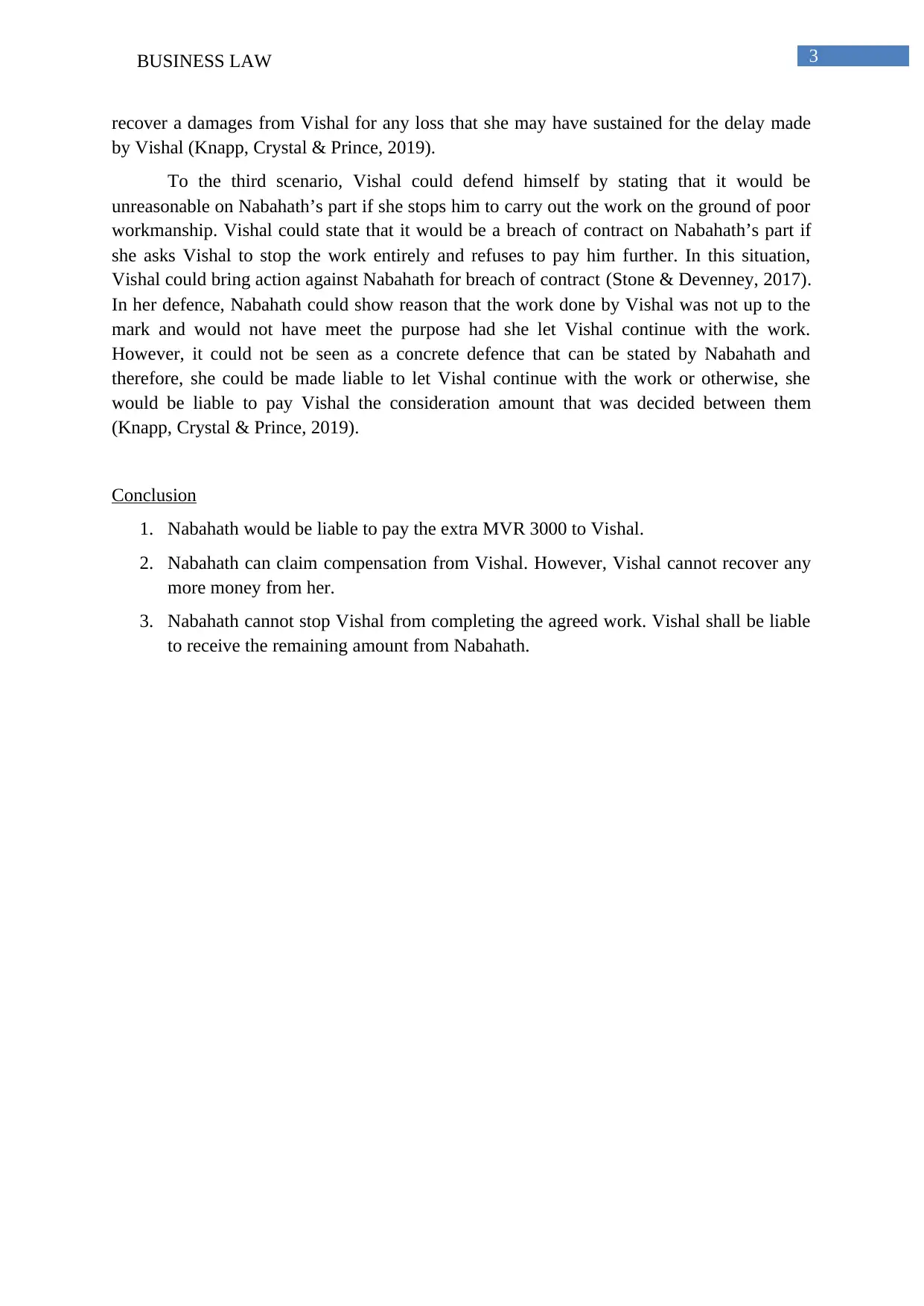
3BUSINESS LAW
recover a damages from Vishal for any loss that she may have sustained for the delay made
by Vishal (Knapp, Crystal & Prince, 2019).
To the third scenario, Vishal could defend himself by stating that it would be
unreasonable on Nabahath’s part if she stops him to carry out the work on the ground of poor
workmanship. Vishal could state that it would be a breach of contract on Nabahath’s part if
she asks Vishal to stop the work entirely and refuses to pay him further. In this situation,
Vishal could bring action against Nabahath for breach of contract (Stone & Devenney, 2017).
In her defence, Nabahath could show reason that the work done by Vishal was not up to the
mark and would not have meet the purpose had she let Vishal continue with the work.
However, it could not be seen as a concrete defence that can be stated by Nabahath and
therefore, she could be made liable to let Vishal continue with the work or otherwise, she
would be liable to pay Vishal the consideration amount that was decided between them
(Knapp, Crystal & Prince, 2019).
Conclusion
1. Nabahath would be liable to pay the extra MVR 3000 to Vishal.
2. Nabahath can claim compensation from Vishal. However, Vishal cannot recover any
more money from her.
3. Nabahath cannot stop Vishal from completing the agreed work. Vishal shall be liable
to receive the remaining amount from Nabahath.
recover a damages from Vishal for any loss that she may have sustained for the delay made
by Vishal (Knapp, Crystal & Prince, 2019).
To the third scenario, Vishal could defend himself by stating that it would be
unreasonable on Nabahath’s part if she stops him to carry out the work on the ground of poor
workmanship. Vishal could state that it would be a breach of contract on Nabahath’s part if
she asks Vishal to stop the work entirely and refuses to pay him further. In this situation,
Vishal could bring action against Nabahath for breach of contract (Stone & Devenney, 2017).
In her defence, Nabahath could show reason that the work done by Vishal was not up to the
mark and would not have meet the purpose had she let Vishal continue with the work.
However, it could not be seen as a concrete defence that can be stated by Nabahath and
therefore, she could be made liable to let Vishal continue with the work or otherwise, she
would be liable to pay Vishal the consideration amount that was decided between them
(Knapp, Crystal & Prince, 2019).
Conclusion
1. Nabahath would be liable to pay the extra MVR 3000 to Vishal.
2. Nabahath can claim compensation from Vishal. However, Vishal cannot recover any
more money from her.
3. Nabahath cannot stop Vishal from completing the agreed work. Vishal shall be liable
to receive the remaining amount from Nabahath.
Paraphrase This Document
Need a fresh take? Get an instant paraphrase of this document with our AI Paraphraser
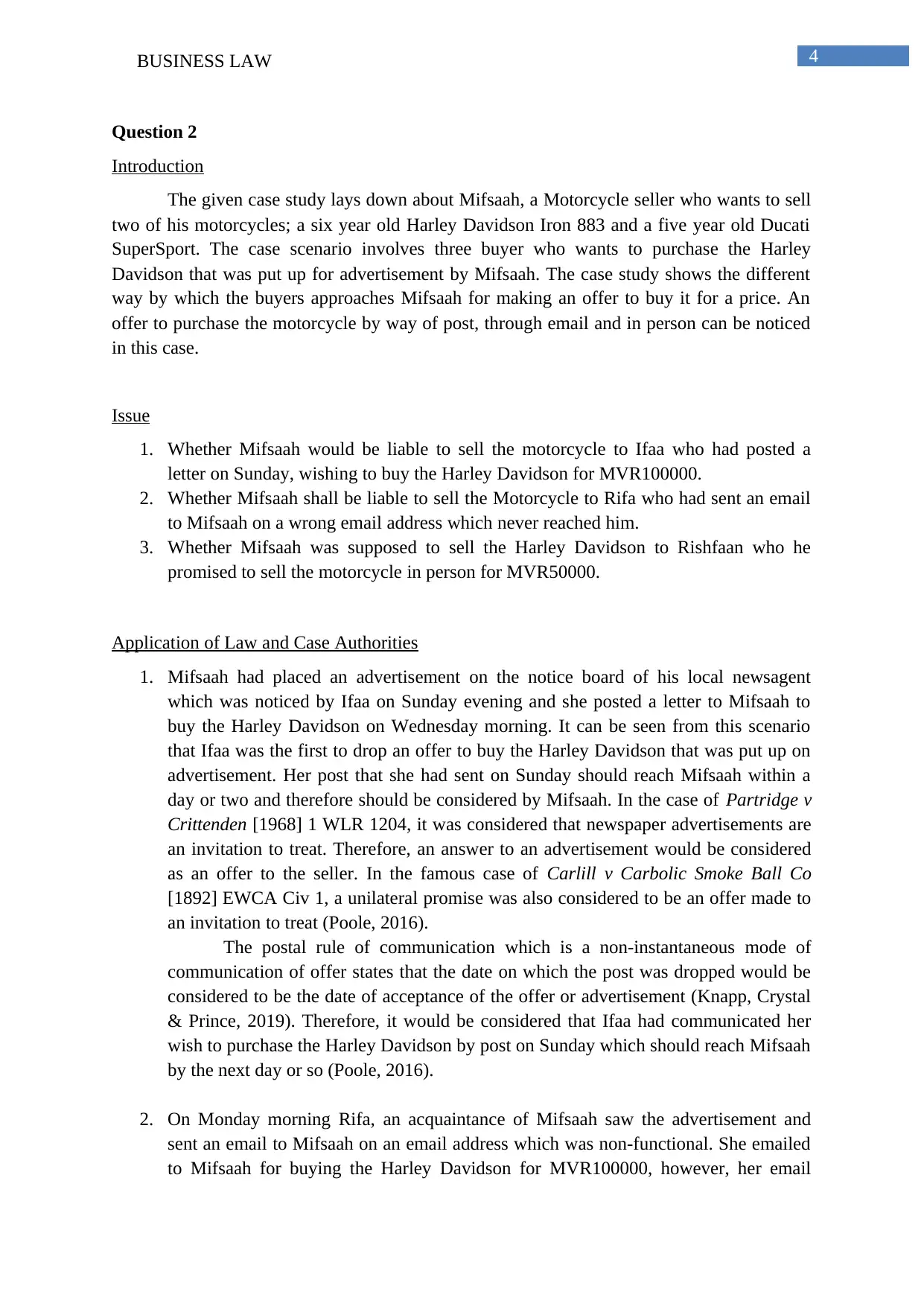
4BUSINESS LAW
Question 2
Introduction
The given case study lays down about Mifsaah, a Motorcycle seller who wants to sell
two of his motorcycles; a six year old Harley Davidson Iron 883 and a five year old Ducati
SuperSport. The case scenario involves three buyer who wants to purchase the Harley
Davidson that was put up for advertisement by Mifsaah. The case study shows the different
way by which the buyers approaches Mifsaah for making an offer to buy it for a price. An
offer to purchase the motorcycle by way of post, through email and in person can be noticed
in this case.
Issue
1. Whether Mifsaah would be liable to sell the motorcycle to Ifaa who had posted a
letter on Sunday, wishing to buy the Harley Davidson for MVR100000.
2. Whether Mifsaah shall be liable to sell the Motorcycle to Rifa who had sent an email
to Mifsaah on a wrong email address which never reached him.
3. Whether Mifsaah was supposed to sell the Harley Davidson to Rishfaan who he
promised to sell the motorcycle in person for MVR50000.
Application of Law and Case Authorities
1. Mifsaah had placed an advertisement on the notice board of his local newsagent
which was noticed by Ifaa on Sunday evening and she posted a letter to Mifsaah to
buy the Harley Davidson on Wednesday morning. It can be seen from this scenario
that Ifaa was the first to drop an offer to buy the Harley Davidson that was put up on
advertisement. Her post that she had sent on Sunday should reach Mifsaah within a
day or two and therefore should be considered by Mifsaah. In the case of Partridge v
Crittenden [1968] 1 WLR 1204, it was considered that newspaper advertisements are
an invitation to treat. Therefore, an answer to an advertisement would be considered
as an offer to the seller. In the famous case of Carlill v Carbolic Smoke Ball Co
[1892] EWCA Civ 1, a unilateral promise was also considered to be an offer made to
an invitation to treat (Poole, 2016).
The postal rule of communication which is a non-instantaneous mode of
communication of offer states that the date on which the post was dropped would be
considered to be the date of acceptance of the offer or advertisement (Knapp, Crystal
& Prince, 2019). Therefore, it would be considered that Ifaa had communicated her
wish to purchase the Harley Davidson by post on Sunday which should reach Mifsaah
by the next day or so (Poole, 2016).
2. On Monday morning Rifa, an acquaintance of Mifsaah saw the advertisement and
sent an email to Mifsaah on an email address which was non-functional. She emailed
to Mifsaah for buying the Harley Davidson for MVR100000, however, her email
Question 2
Introduction
The given case study lays down about Mifsaah, a Motorcycle seller who wants to sell
two of his motorcycles; a six year old Harley Davidson Iron 883 and a five year old Ducati
SuperSport. The case scenario involves three buyer who wants to purchase the Harley
Davidson that was put up for advertisement by Mifsaah. The case study shows the different
way by which the buyers approaches Mifsaah for making an offer to buy it for a price. An
offer to purchase the motorcycle by way of post, through email and in person can be noticed
in this case.
Issue
1. Whether Mifsaah would be liable to sell the motorcycle to Ifaa who had posted a
letter on Sunday, wishing to buy the Harley Davidson for MVR100000.
2. Whether Mifsaah shall be liable to sell the Motorcycle to Rifa who had sent an email
to Mifsaah on a wrong email address which never reached him.
3. Whether Mifsaah was supposed to sell the Harley Davidson to Rishfaan who he
promised to sell the motorcycle in person for MVR50000.
Application of Law and Case Authorities
1. Mifsaah had placed an advertisement on the notice board of his local newsagent
which was noticed by Ifaa on Sunday evening and she posted a letter to Mifsaah to
buy the Harley Davidson on Wednesday morning. It can be seen from this scenario
that Ifaa was the first to drop an offer to buy the Harley Davidson that was put up on
advertisement. Her post that she had sent on Sunday should reach Mifsaah within a
day or two and therefore should be considered by Mifsaah. In the case of Partridge v
Crittenden [1968] 1 WLR 1204, it was considered that newspaper advertisements are
an invitation to treat. Therefore, an answer to an advertisement would be considered
as an offer to the seller. In the famous case of Carlill v Carbolic Smoke Ball Co
[1892] EWCA Civ 1, a unilateral promise was also considered to be an offer made to
an invitation to treat (Poole, 2016).
The postal rule of communication which is a non-instantaneous mode of
communication of offer states that the date on which the post was dropped would be
considered to be the date of acceptance of the offer or advertisement (Knapp, Crystal
& Prince, 2019). Therefore, it would be considered that Ifaa had communicated her
wish to purchase the Harley Davidson by post on Sunday which should reach Mifsaah
by the next day or so (Poole, 2016).
2. On Monday morning Rifa, an acquaintance of Mifsaah saw the advertisement and
sent an email to Mifsaah on an email address which was non-functional. She emailed
to Mifsaah for buying the Harley Davidson for MVR100000, however, her email
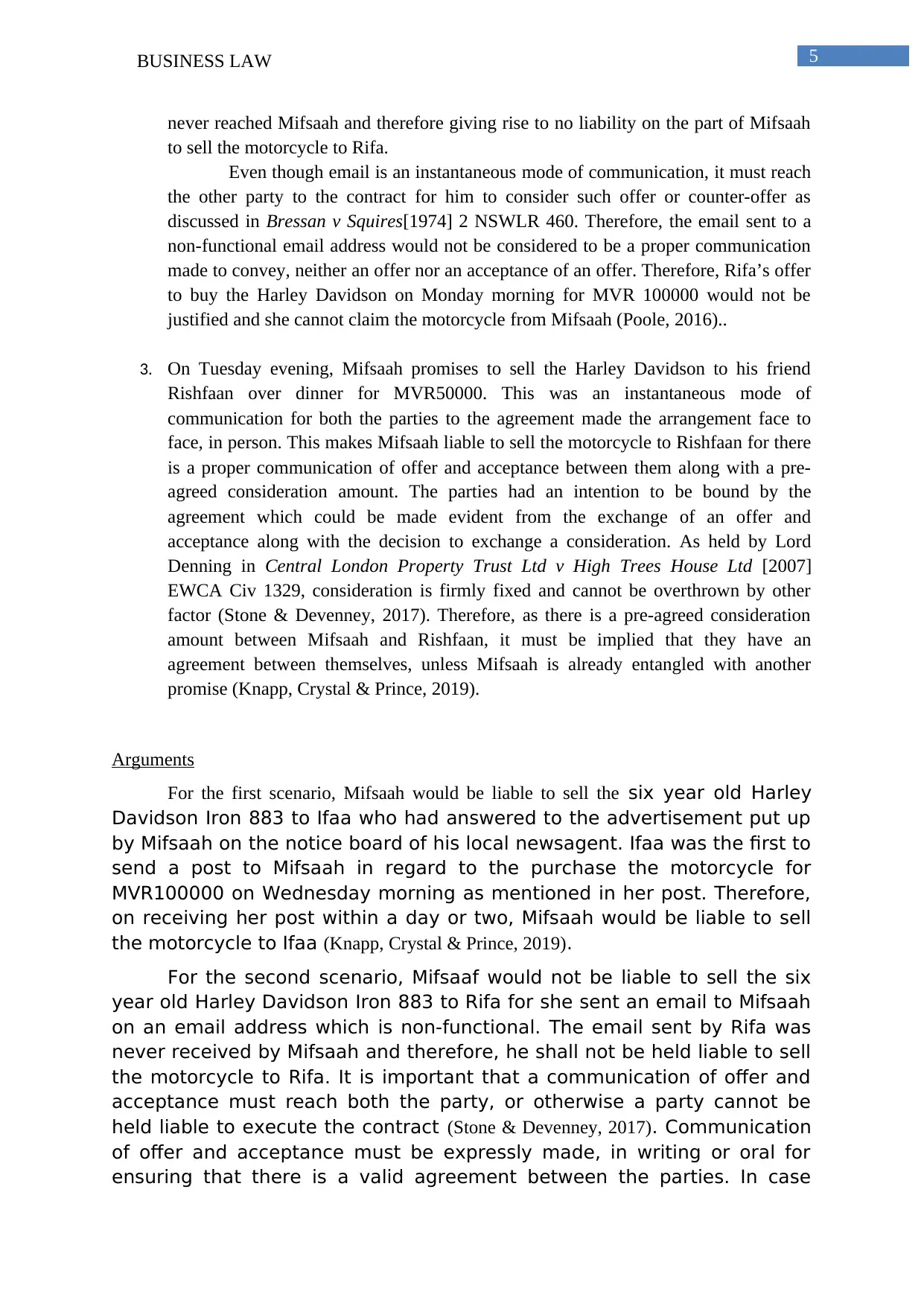
5BUSINESS LAW
never reached Mifsaah and therefore giving rise to no liability on the part of Mifsaah
to sell the motorcycle to Rifa.
Even though email is an instantaneous mode of communication, it must reach
the other party to the contract for him to consider such offer or counter-offer as
discussed in Bressan v Squires[1974] 2 NSWLR 460. Therefore, the email sent to a
non-functional email address would not be considered to be a proper communication
made to convey, neither an offer nor an acceptance of an offer. Therefore, Rifa’s offer
to buy the Harley Davidson on Monday morning for MVR 100000 would not be
justified and she cannot claim the motorcycle from Mifsaah (Poole, 2016)..
3. On Tuesday evening, Mifsaah promises to sell the Harley Davidson to his friend
Rishfaan over dinner for MVR50000. This was an instantaneous mode of
communication for both the parties to the agreement made the arrangement face to
face, in person. This makes Mifsaah liable to sell the motorcycle to Rishfaan for there
is a proper communication of offer and acceptance between them along with a pre-
agreed consideration amount. The parties had an intention to be bound by the
agreement which could be made evident from the exchange of an offer and
acceptance along with the decision to exchange a consideration. As held by Lord
Denning in Central London Property Trust Ltd v High Trees House Ltd [2007]
EWCA Civ 1329, consideration is firmly fixed and cannot be overthrown by other
factor (Stone & Devenney, 2017). Therefore, as there is a pre-agreed consideration
amount between Mifsaah and Rishfaan, it must be implied that they have an
agreement between themselves, unless Mifsaah is already entangled with another
promise (Knapp, Crystal & Prince, 2019).
Arguments
For the first scenario, Mifsaah would be liable to sell the six year old Harley
Davidson Iron 883 to Ifaa who had answered to the advertisement put up
by Mifsaah on the notice board of his local newsagent. Ifaa was the first to
send a post to Mifsaah in regard to the purchase the motorcycle for
MVR100000 on Wednesday morning as mentioned in her post. Therefore,
on receiving her post within a day or two, Mifsaah would be liable to sell
the motorcycle to Ifaa (Knapp, Crystal & Prince, 2019).
For the second scenario, Mifsaaf would not be liable to sell the six
year old Harley Davidson Iron 883 to Rifa for she sent an email to Mifsaah
on an email address which is non-functional. The email sent by Rifa was
never received by Mifsaah and therefore, he shall not be held liable to sell
the motorcycle to Rifa. It is important that a communication of offer and
acceptance must reach both the party, or otherwise a party cannot be
held liable to execute the contract (Stone & Devenney, 2017). Communication
of offer and acceptance must be expressly made, in writing or oral for
ensuring that there is a valid agreement between the parties. In case
never reached Mifsaah and therefore giving rise to no liability on the part of Mifsaah
to sell the motorcycle to Rifa.
Even though email is an instantaneous mode of communication, it must reach
the other party to the contract for him to consider such offer or counter-offer as
discussed in Bressan v Squires[1974] 2 NSWLR 460. Therefore, the email sent to a
non-functional email address would not be considered to be a proper communication
made to convey, neither an offer nor an acceptance of an offer. Therefore, Rifa’s offer
to buy the Harley Davidson on Monday morning for MVR 100000 would not be
justified and she cannot claim the motorcycle from Mifsaah (Poole, 2016)..
3. On Tuesday evening, Mifsaah promises to sell the Harley Davidson to his friend
Rishfaan over dinner for MVR50000. This was an instantaneous mode of
communication for both the parties to the agreement made the arrangement face to
face, in person. This makes Mifsaah liable to sell the motorcycle to Rishfaan for there
is a proper communication of offer and acceptance between them along with a pre-
agreed consideration amount. The parties had an intention to be bound by the
agreement which could be made evident from the exchange of an offer and
acceptance along with the decision to exchange a consideration. As held by Lord
Denning in Central London Property Trust Ltd v High Trees House Ltd [2007]
EWCA Civ 1329, consideration is firmly fixed and cannot be overthrown by other
factor (Stone & Devenney, 2017). Therefore, as there is a pre-agreed consideration
amount between Mifsaah and Rishfaan, it must be implied that they have an
agreement between themselves, unless Mifsaah is already entangled with another
promise (Knapp, Crystal & Prince, 2019).
Arguments
For the first scenario, Mifsaah would be liable to sell the six year old Harley
Davidson Iron 883 to Ifaa who had answered to the advertisement put up
by Mifsaah on the notice board of his local newsagent. Ifaa was the first to
send a post to Mifsaah in regard to the purchase the motorcycle for
MVR100000 on Wednesday morning as mentioned in her post. Therefore,
on receiving her post within a day or two, Mifsaah would be liable to sell
the motorcycle to Ifaa (Knapp, Crystal & Prince, 2019).
For the second scenario, Mifsaaf would not be liable to sell the six
year old Harley Davidson Iron 883 to Rifa for she sent an email to Mifsaah
on an email address which is non-functional. The email sent by Rifa was
never received by Mifsaah and therefore, he shall not be held liable to sell
the motorcycle to Rifa. It is important that a communication of offer and
acceptance must reach both the party, or otherwise a party cannot be
held liable to execute the contract (Stone & Devenney, 2017). Communication
of offer and acceptance must be expressly made, in writing or oral for
ensuring that there is a valid agreement between the parties. In case
⊘ This is a preview!⊘
Do you want full access?
Subscribe today to unlock all pages.

Trusted by 1+ million students worldwide
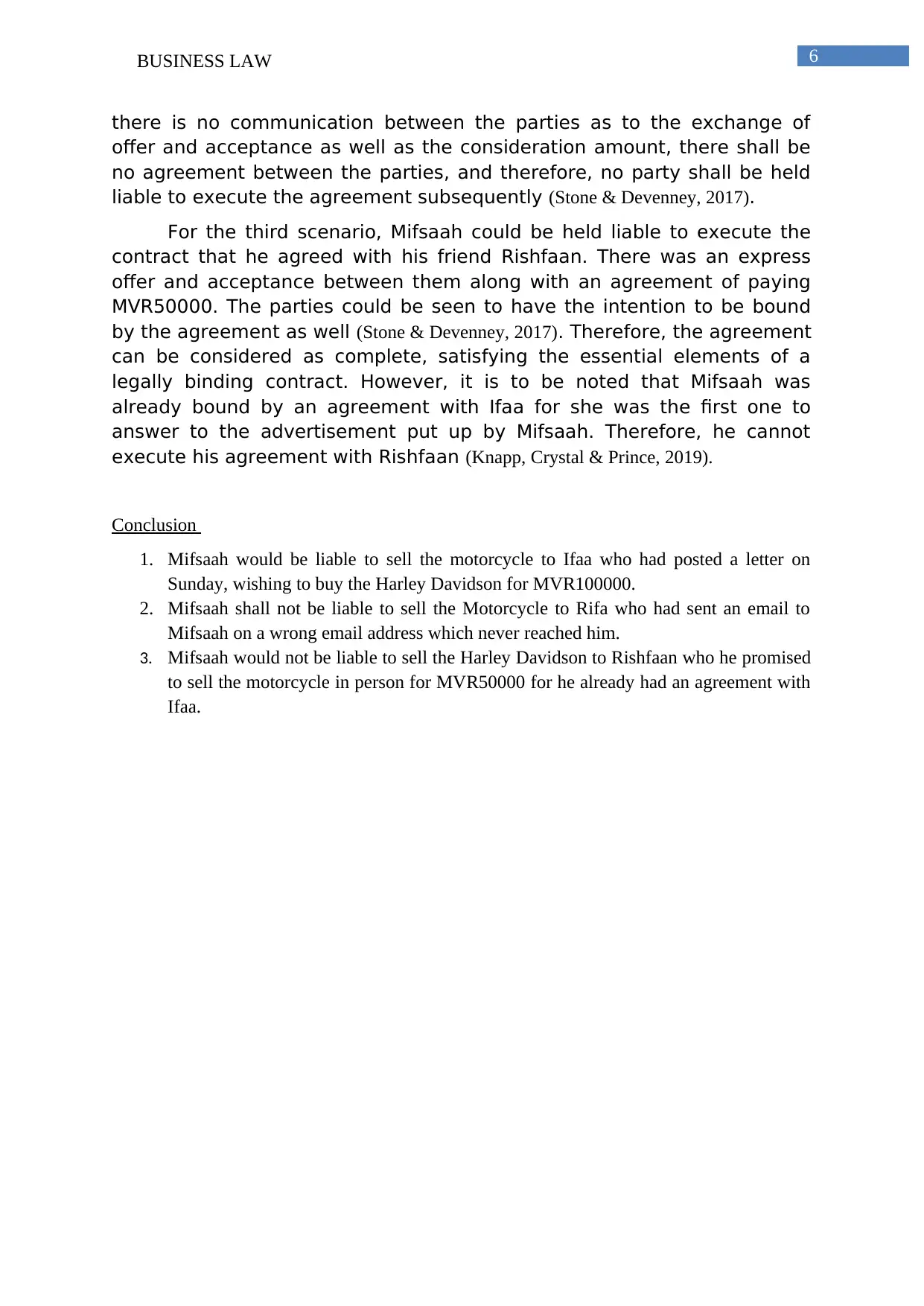
6BUSINESS LAW
there is no communication between the parties as to the exchange of
offer and acceptance as well as the consideration amount, there shall be
no agreement between the parties, and therefore, no party shall be held
liable to execute the agreement subsequently (Stone & Devenney, 2017).
For the third scenario, Mifsaah could be held liable to execute the
contract that he agreed with his friend Rishfaan. There was an express
offer and acceptance between them along with an agreement of paying
MVR50000. The parties could be seen to have the intention to be bound
by the agreement as well (Stone & Devenney, 2017). Therefore, the agreement
can be considered as complete, satisfying the essential elements of a
legally binding contract. However, it is to be noted that Mifsaah was
already bound by an agreement with Ifaa for she was the first one to
answer to the advertisement put up by Mifsaah. Therefore, he cannot
execute his agreement with Rishfaan (Knapp, Crystal & Prince, 2019).
Conclusion
1. Mifsaah would be liable to sell the motorcycle to Ifaa who had posted a letter on
Sunday, wishing to buy the Harley Davidson for MVR100000.
2. Mifsaah shall not be liable to sell the Motorcycle to Rifa who had sent an email to
Mifsaah on a wrong email address which never reached him.
3. Mifsaah would not be liable to sell the Harley Davidson to Rishfaan who he promised
to sell the motorcycle in person for MVR50000 for he already had an agreement with
Ifaa.
there is no communication between the parties as to the exchange of
offer and acceptance as well as the consideration amount, there shall be
no agreement between the parties, and therefore, no party shall be held
liable to execute the agreement subsequently (Stone & Devenney, 2017).
For the third scenario, Mifsaah could be held liable to execute the
contract that he agreed with his friend Rishfaan. There was an express
offer and acceptance between them along with an agreement of paying
MVR50000. The parties could be seen to have the intention to be bound
by the agreement as well (Stone & Devenney, 2017). Therefore, the agreement
can be considered as complete, satisfying the essential elements of a
legally binding contract. However, it is to be noted that Mifsaah was
already bound by an agreement with Ifaa for she was the first one to
answer to the advertisement put up by Mifsaah. Therefore, he cannot
execute his agreement with Rishfaan (Knapp, Crystal & Prince, 2019).
Conclusion
1. Mifsaah would be liable to sell the motorcycle to Ifaa who had posted a letter on
Sunday, wishing to buy the Harley Davidson for MVR100000.
2. Mifsaah shall not be liable to sell the Motorcycle to Rifa who had sent an email to
Mifsaah on a wrong email address which never reached him.
3. Mifsaah would not be liable to sell the Harley Davidson to Rishfaan who he promised
to sell the motorcycle in person for MVR50000 for he already had an agreement with
Ifaa.
Paraphrase This Document
Need a fresh take? Get an instant paraphrase of this document with our AI Paraphraser
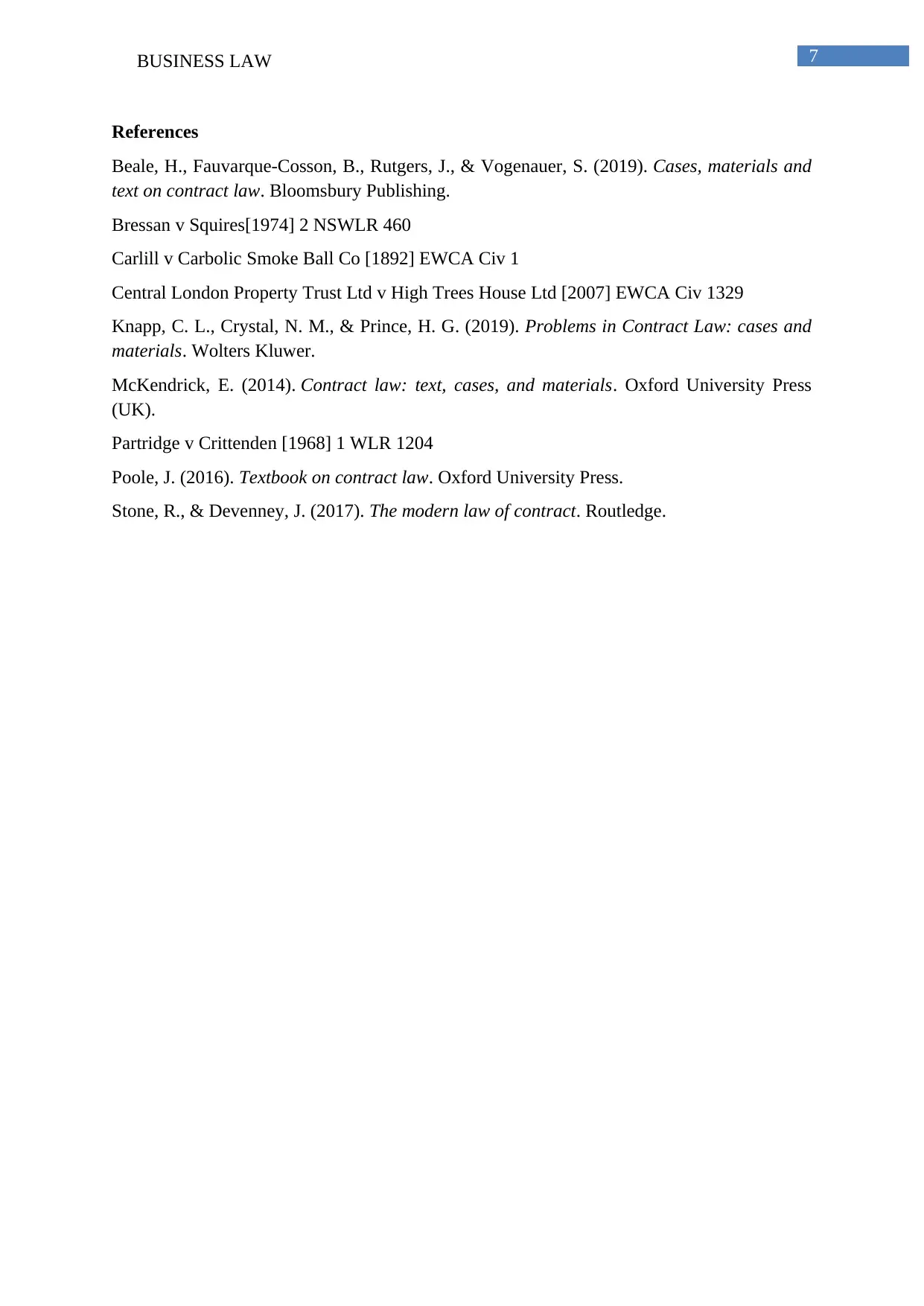
7BUSINESS LAW
References
Beale, H., Fauvarque-Cosson, B., Rutgers, J., & Vogenauer, S. (2019). Cases, materials and
text on contract law. Bloomsbury Publishing.
Bressan v Squires[1974] 2 NSWLR 460
Carlill v Carbolic Smoke Ball Co [1892] EWCA Civ 1
Central London Property Trust Ltd v High Trees House Ltd [2007] EWCA Civ 1329
Knapp, C. L., Crystal, N. M., & Prince, H. G. (2019). Problems in Contract Law: cases and
materials. Wolters Kluwer.
McKendrick, E. (2014). Contract law: text, cases, and materials. Oxford University Press
(UK).
Partridge v Crittenden [1968] 1 WLR 1204
Poole, J. (2016). Textbook on contract law. Oxford University Press.
Stone, R., & Devenney, J. (2017). The modern law of contract. Routledge.
References
Beale, H., Fauvarque-Cosson, B., Rutgers, J., & Vogenauer, S. (2019). Cases, materials and
text on contract law. Bloomsbury Publishing.
Bressan v Squires[1974] 2 NSWLR 460
Carlill v Carbolic Smoke Ball Co [1892] EWCA Civ 1
Central London Property Trust Ltd v High Trees House Ltd [2007] EWCA Civ 1329
Knapp, C. L., Crystal, N. M., & Prince, H. G. (2019). Problems in Contract Law: cases and
materials. Wolters Kluwer.
McKendrick, E. (2014). Contract law: text, cases, and materials. Oxford University Press
(UK).
Partridge v Crittenden [1968] 1 WLR 1204
Poole, J. (2016). Textbook on contract law. Oxford University Press.
Stone, R., & Devenney, J. (2017). The modern law of contract. Routledge.
1 out of 8
Related Documents
Your All-in-One AI-Powered Toolkit for Academic Success.
+13062052269
info@desklib.com
Available 24*7 on WhatsApp / Email
![[object Object]](/_next/static/media/star-bottom.7253800d.svg)
Unlock your academic potential
Copyright © 2020–2026 A2Z Services. All Rights Reserved. Developed and managed by ZUCOL.


![Law of Contract: Case Study Analysis - [University Name] - Semester 1](/_next/image/?url=https%3A%2F%2Fdesklib.com%2Fmedia%2Fimages%2Fhq%2F0404b5624cf445b383d7b5eea9ff8f72.jpg&w=256&q=75)


